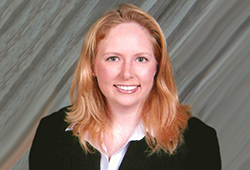Bequests Q & A - Estate Planning Advice for Millennials

Jennifer Kincaid understands what millennials are thinking. After all, she is one. But this 2003 SAU graduate is also a partner at Pepping, Balk, Kincaid & Olson, LTD in Silvis, Ill., so she knows why estate planning is important for young adults. Jennifer's blend of legal savvy and Fighting Bee pride is a major asset to the St. Ambrose University Planned Giving Advisory Council. Her expertise in Iowa and Illinois law, as well as estate planning, is vital to the university as it navigates various charitable gifts. Her perceptions and insight as a young alumna makes her an invaluable asset to the council as the university tries to stay engaged with its expanding young alumni base. Jennifer recently took some time to answer questions young alumni might have about estate planning.
Q. Do I really need an estate plan?
A. Yes, estate plans are not about wealth, they encompass personal decisions while you are alive or after you pass away. It's a plan that names the people who can make decisions for you if you can't. For example, if you have an accident and are unable to communicate your wishes, an estate plan names those who can make decisions for you in that situation. It provides peace of mind that your wishes and directives will be followed instead of deferring to the state statutes.
Q. What's the cost of setting up an estate plan?
A. It varies, but the average cost for a single person is between $300 and $500 for a basic estate plan. It's important to know that every state has their
own rules and regulations regarding the validity and proper method to execute these documents, which is not taken into account when using a website or
template. People may think they are saving money, but in my experience, you can work with an attorney for about the same price. Working with an attorney
includes peace of mind knowing you have a valid document and you have access to a professional who can answer your questions and provide advice.
Q. When should I create and update my estate plan?
A. You should create your first estate plan when you get your first real job. Common triggers for reviewing your plan include marriage, birth, adoption,
divorce, death, and significant changes in financial situations.
Q. How long does the process take?
A. A typical timeframe is 30 days, which includes meeting with an attorney to discuss your wishes and creating the appropriate paperwork. An attorney
should walk you through each document (including a will, power of attorney for property and healthcare, and a living will) to explain the purpose of each
and provide insight into the person(s) who would be appropriate for the various roles.
Q. Why should I have an estate plan if I'm … (single, married, have kids)?
A. Note: If you don't have an estate plan, your assets will transfer via the intestacy laws of the state where you live when you pass.
A. If you're single with no children, your parents typically inherit your possessions and make your decisions. It's important to consider and choose the
person you want to be in charge of your affairs and making decisions regarding your property and healthcare.
A. If you're married with no children, all property goes to your spouse, and that person also makes any decisions by default. It's possible you want to make arrangements to ensure family heirlooms or other assets go to another family member. You may also want to make provisions for a charitable gift in your estate.
A. If you're married with kids, it's important to choose guardians for your children if both parents are gone. An estate plan can name the responsible people and ensure there are funds to take care of the children.
Q. How do I get started?
A. Ask friends and family for personal recommendations of estate planning attorneys. This is a great way to find someone you can trust. If there are no recommendations, contact the local bar association to get list of attorneys and review their credentials. As you begin this process, it's a good idea to create a list of questions for your attorney, review your personal assets, and think about the people in your life you trust to make decisions on your behalf. A good attorney will explain everything, walk you through, and get you the right documents. And make sure you review the documents carefully and ask any questions you have before signing your estate plan.
Q. What's one thing you think everyone should know about charitable gift planning as it relates to estate planning?
A. Charitable giving is not just for the ultra-wealthy; it's for everyone. All ranges of estate gifts are appreciated. Any institution you give to will be grateful for any gift. Many times, people make provisions to leave a small amount or percentage to a charitable organization.
Thank you to Jennifer for her time and expertise. If you are interested in receiving educational materials to help you begin planning your estate or refining the plan you already have in place, please contact Sally Crino at 563-333-6080 or [email protected].
You can also browse our planned giving website to find articles related to specific topics.



